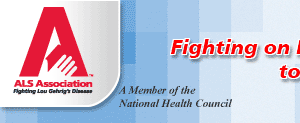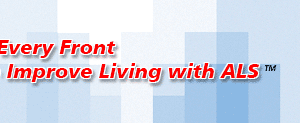|
May 29, 2009
International Group of Scientists and Drug Company Representatives
Meet to Discuss Treatments for ALS
In April, The ALS Association convened a meeting of its Drug Company Working Group, bringing together more than 50 ALS researchers, clinicians, representatives of the pharmaceutical and biotech industries and the federal government, all of whom are working to create treatments for ALS.
The group discussed advances in four paths to treatment of ALS. Members exchanged ideas, asked each other hard questions, and worked together as they refined their approaches to their shared goal, helping to treat ALS.
Anders Haegerstand, M.D., Ph.D., of NeuroNova in Stockholm, Sweden, told the group about a clinical trial of VEGF (vascular endothelial growth factor) that is starting up in Belgium. VEGF is a natural growth factor that helps survival of motor neurons (the cells that die in ALS). Unlike other growth factors being explored for ALS treatment, Dr. Haegerstand said, VEGF is known to be deficient in ALS, making it logical to try elevating it. Experiments in animal models suggest it may help prolong survival. Partnering with larger pharmaceutical and medical device companies, the firm has developed a way to bring VEGF directly into the central nervous system. The drug is delivered by a pump that is currently used to deliver other types of medicines to patients with brain or spinal cord injuries.
The trial underway in Belgium is a randomized, double-blind placebo-controlled study, meaning that patients are randomly assigned to receive either VEGF or a placebo (inactive substance), and neither the patient nor physician knows who is getting which treatment. Such trials are vital to show that any beneficial effects are truly due to the treatment, rather than to the psychological effects of receiving a treatment. This trial is not currently open to new patients. Results from the trial will be used to determine if larger trials are justified.
Cytokinetics, a biotechnology company in San Francisco, focuses on muscle, according to Alan Russell, Ph.D., who directs their therapeutic program for ALS. In ALS, patients are weak because their muscles are not receiving enough stimulation from their motor neurons. Dr. Russell’s group is developing a drug that boosts the muscle’s activity to compensate for this reduced stimulation. Their hope is that these drugs will preserve strength, maintaining activity longer and delaying the time until a patient needs a ventilator to assist their breathing. They are getting ready to perform safety trials in humans later this year. These initial trials will be in people without ALS, to make sure it is safe for use. Dr. Russell pointed out that trials of this compound are likely to be very quick, since its effect—strengthening muscle—should be observable almost immediately.
Cambria Pharmaceuticals, of Woburn, Massachusetts, is developing drugs that prevent protein aggregation, according to Don Kirsch, Ph.D., vice president of drug discovery. In ALS, motor neurons develop clumps of protein (aggregates), which are believed to play a role in hastening the death of the neuron. The company has analyzed thousands of compounds and has found a small number that inhibit aggregation and promote survival of motor neurons. Dr. Kirsch described the great lengths their group goes to to improve the characteristics of these compounds, chemically modifying them to make them safer and more effective. They are beginning trials in animal models of ALS with their best compounds.
Clinical Trial Open in Familial ALS
One challenge in ALS research is that many treatments that work in animal models don’t show the same benefit when applied to people. One possible reason is that in most people, some part of the disease process may differ from that in the animal models, because most people don’t carry the mutation in the gene (called the SOD1 gene) that is used to create the animal model. The SOD1 gene is responsible for approximately 20 percent of all familial cases of ALS.
But some people do carry these mutations, and so Michael Benatar, MBChB, DPhil, of Emory University in Atlanta, Georgia, has begun a clinical trial specifically for these patients, testing a drug that has worked in animals with similar mutations. The hope, he said, is that the drug will have the same beneficial effect in people as has been seen in the animals.
The drug is called arimoclomol, and it is being tested in a randomized, double-blind, placebo-controlled study in patients carrying mutations in the SOD1 gene. Patients with familial ALS (that is, those with another affected family member) are encouraged to contact Dr. Benatar’s group to see if they are eligible. A gene test will be done to determine whether the patient has the appropriate mutation. Patients in the study must travel to one of the study sites (either Emory University or Massachusetts General Hospital in Boston) for initial evaluation, but transportation and lodging is paid for by the study. Later evaluations are being done in the home or over the phone. Patients wishing to determine if they are eligible may contact Dr. Benatar at [email protected] or 404-712-8578. Further details about the trial are available here.
The ALS Association established the Drug Company Working Group to promote ALS treatment development by bringing together leaders from throughout the ALS community, including clinicians and researchers, representatives from academia and industry, as well as those from government agencies, such as the National Institutes of Health. The meeting is coordinated by the Advocacy, Research and Patient Services Departments of The Association and presents a unique opportunity for the ALS community not only to discuss the status of basic and clinical research in ALS, but also to identify the challenges, obstacles and opportunities that are available to bring promising new research from the lab to the bedside. One of the priorities of the Drug Company Working Group is to accelerate the development of new treatments for ALS.
|



